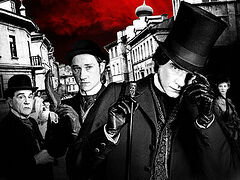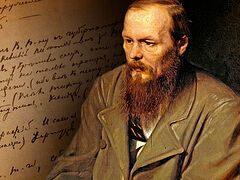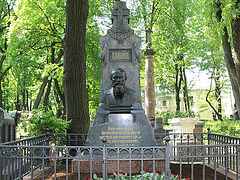 Dmitry Andreevich Dostoyevsky —Do you know the rest of the Dostoyevsky family?
Dmitry Andreevich Dostoyevsky —Do you know the rest of the Dostoyevsky family?
—I knew that my family was the only bearer of surname Dostoyevsky passed down directly from Feodor Mikhailovich. But one day someone told me: “We know there is a Roman Dostoyevsky, who exceeded the target by one hundred and twenty percent and he was awarded for doing just that.” One of Dostoyevsky’s fans suggested: “I’ve got free time, let me find this Roman Dostoyevsky. What if he is your relative?” He found him in Leningrad. And Roman immediately reported: “I am Dostoyevsky but a different kind.” I told him: “I’m glad you admitted right away you aren’t that one as I am the one.” Finally, I learned that his ancestors resided in one of the governorate provinces (Tverskaya, if I’m not mistaken!) where they saw a decree issued by Ulyanov-Lenin allowing a change of the last names for certain reasons. For example, the most common last name in a village was, say, “Dungman” (pardon my language!) and the locals decided it didn’t sound quite melodious. So, they came to a local record clerk who happened to be a bibliophile. And this well-read man then told them: “Aha, so let’s change your last names. You will be the Pushkins, you, the Lermontovs, and those will be the Tolstoys…” And all of them changed their last names this way. That’s what this Roman Dostoyevsky heard from his parents about how they got their family name.
Once, I shared this story with a journalist from NTV channel and they made a really nice short documentary about this village where a Pushkina carries pails of water hung over the carrying pole, and a guy is lugging loads of potatoes from the cellar. “What’s your name?” he is asked. “I am Turgenev,” is the reply. Quite amusing. So, here’s this Roman Dostoyevsky who now resides in our city. Later, a rather well-known journalist from the “Leningrad Pravda” newspaper came up to and said: “I am Daria Dostoyevskaya.” I said, “I know, I saw your signature under your articles in the newspaper.” I told her about that story with the Dostoyevkys. She said: “Well, now I get the full picture!” There are genuine descendants, and then there are others, our working folk, the different kinds of Dostoyevskys.
About great-grandson and Feodor the fourth
—Tell us about your grandchildren and your son.
—My wife and I never had any trouble with our son when he was growing up. Alexey is over forty years old; he found his vocation and enjoys it. He likes his job as it presents an opportunity to lead an exciting life and earn enough to bring up four children. Our grandson Fedya is in the fourth grade, he is eleven. Fed’ka also attends the music school where his sisters studied before him. All four of them were at the head of their music school cleass because Feodor Mikhailovich Dostoyevsky’s relatives are known to be musically talented. For example, his nephew Feodor Mikhailovich Jr. was a singer well known in central Russia, who gave piano recitals and later in life became an owner of a music store selling grand pianos and other pianos. One of Feodor Mikhailovich’s relatives was a singer, as well. So, musical and singing talents are hereditary.
Anytime I meet with young people, I strongly advise them to interview their ancestors—be it their grandmas or grandpas, great-grandmothers and great-grandfathers—about their lives, what interested them or what memories they keep, because a lot of things can be inherited. For example, the writer’s daughter Liuba had a sweet tooth, and I see how this, so to speak, “carboholism,” continues to do its harm in his descendants. Feodor Mikhailovich was good at drawing and my father used to draw (his notebook full of sketches is in the museum in Staraya Russa). I can draw, too. Small things are also inherited, such as the habit of taking a short nap during the day like my father used to do, as also did my son’s great-grandfather. Both Alexey and I take short naps during the day, too. Naturally, the gene of writing gradually dies off. I write short novels, and people who have read them commented that they are quite engaging to read. As for my granddaughters, I can sense they’ve got a skill of putting words together; they aren’t afraid of composing written text. Therefore, new generations inherit a lot of character traits, habits, and hobbies of their ancestors. I am conservative, to a certain extent. We, the descendants of Feodor Mikhailovich, inherited his conservatism to the last detail.
When it was time for my son Alexey to serve in the army, he served in an Orthodox military unit. Having received the military service exemption certificate, or “white card,” due to his ulcer, he stayed at a monastery. While there, he just couldn’t make sense of his fascination with horses. He would spend whole evenings in the stable. Later on, when he found out that his great-grandfather worked with horses throughout his life, Alexey said: “Okay, I get it now.” Even hobbies like these can be inherited. There could have been someone who made hats, and then all of a sudden someone is drawn to do the same in two or three generations. That’s why I advise young people to interview their family members to gain a better understanding of themselves.
About Shukshin’s dream that came true
—This year, Russia Channel One showed a documentary about Alexey and you.
—We were surprised and rather dumbfounded when we heard of it because they filmed us three years ago. And they told us right away that the Arts Council has accepted this documentary about the Dostoyevskys. I’ve no idea why they kept it in cold storage for so long. They shot it on our dacha that we been renovating during these three years. Even our neighbors aren’t the same—our former next-door neighbors demolished their house. That is, so much has changed over the course of three years. The film’s setting changed a lot—it is us who possibly didn’t change too much.
—Dmitry Andreyevich, how did you end up getting a cameo role in the movie “The Boys” based on the novel, The Brothers Karamazov?
—It’s an old story. The late Vasily Shukshin dreamed about making a movie based on the tenth chapter of The Brothers Karamazov. With children as main characters, it essentially hits the recurring theme in Dostoyevsky’s works, beginning from Poor Folk to The Brothers Karamazov. But Shukshin’s idea was ignored and he died soon afterward, so his movie was never made. His classmates, Yury and Renata Grigoriyev, a husband-and-wife team, decided to execute his will and made a really good movie at the Gorky Film Studio. Renata died not long ago. Memory eternal! We met both of them in Staraya Russa where Dostoyevsky wrote his The Brothers Karamazov and where the Grigoriyevs attempted to shoot their movie “The Boys” based on this novel. In 1989, they invited me to take part in the shooting as a consultant and I had a cameo role of a teacher at a gymnasium school. Unfortunately, not much was preserved of Staraya Russa from Dostoyevsky’s days, so they shot it mostly in Yelets. I had my son with me and the producers asked, “Maybe Alyosha would like to play a part in our movie, too?” He was thirteen at the time. They invited a great-grandson of Feodor Mikhailovich to play the part of Kolya Krasotkin.
The movie was quite a hit here in Russia as well as in Japan, where Gorbachev brought only two movies, one of them being ours, “The Boys.” Alyosha was thrilled to be able to hear his character speaking Japanese. Lyosha didn’t speak Japanese, of course, but the movie was dubbed. I wasn’t surprised to hear the favorable reviews about my son playing Kolya Krasotkin, since it was also part of our DNA±amateur theater acting was yet another hobby of Feodor Mikhailovich’s. A lot of his contemporaries wrote that he was quite good at it. In Staraya Russa, the Dostoyevsky family used to stage small plays that had roles written for kids. For example, they would act out, “The Dragonfly and the Ant” by Krylov, or other fables.
About beloved Staraya Russa and the miracle-working Starorusskaya Icon
—I’ve heard that you are personally deeply connected with Staraya Russa.
—I love Staraya Russa very much, and it upsets me that due to my arthritis and old age, I can’t get on my feet since last winter just as I can’t go and visit Staraya Russa to see how Vera Ivanovna Bogdanova is doing, the former museum director, or visit other museum employees. I love them dearly. Many of them helped me during difficult times and I helped many of them whenever I could. Over these years, we came together as a family. But I truly hope that my offspring will replace me in Staraya Russa and be worthy to serve as representatives of the Dostoyevsky family, just as I tried to present Feodor Mikhailovich at the readings in Staraya Russa. It brings me joy to reminisce about the readings we’ve given there before, and I always keep those people we worked with in my prayers. On former occasions, I traditionally wrote addresses to children—the participants of the Staraya Russa Readings for Children. This year, it is quite upsetting that not only was I unable to come to Staraya Russa in spring, but I couldn’t write the children’s address either. I ask them to forgive me and I am hopeful that we will have things get back to normal as before. Feodor Mikhailovich always distinguished the children’s characters in his novels and emphasized their special role, as it was, for example, in the tenth chapter of The Brothers Karamazov.
 Staraya Russa. The Church of St. George the Victorious. Photo by: sobory.ru
Staraya Russa. The Church of St. George the Victorious. Photo by: sobory.ru
—Anytime we were in Staraya Russa, we prayed at the Church of the Greatmartyr George the Victorious. Feodor Mikhailovich was a parishioner of this church—the oldest in town.
—It is a special church for me. I suffered from a stomach ulcer, and anytime I was in Staraya Russia I would always have terrible spasms because the local water constitution differs drastically from the one in Leningrad. One day I ended up going to this church against my wishes, as I had to be at a different place. No one was inside the St. George Church and the service was long over. The elderly ladies were busy mopping the floors and I knew I had come there at the wrong time. As I was standing next to the Starorusskaya Icon of the Mother of God, I went through a catharsis—a grown man, I suddenly burst into crying. I left without ever realizing what had just happened. Then, a day later, I found out that I had no pain whatsoever, that I am healthy again and full of renewed strength. Typically, I had to leave the readings early, missing out on many interesting reports, the closing ceremony, and the banquet with the local officials from Staraya Russa. On that day, everyone exclaimed in disbelief, “Dmitry Andreyevich, we can finally see you at our farewell banquet!”
 Starorusskaya Icon of the Mother of God at the Church of the Greatmartyr George the Victorious in Staraya Russa. Photo by: russablago.ru With the blessing of clergymen from the St. George Church, I can happily share the story about the Lord’s miracle and my healing from a stomach ulcer in front of the Starorusskaya Icon. Many others were not only healed from illnesses but also received help for various life situations through the intercession of the Mother of God. If anyone among your readers happens to visit Staraya Russa, please do come to this church and pray before the icon.
Starorusskaya Icon of the Mother of God at the Church of the Greatmartyr George the Victorious in Staraya Russa. Photo by: russablago.ru With the blessing of clergymen from the St. George Church, I can happily share the story about the Lord’s miracle and my healing from a stomach ulcer in front of the Starorusskaya Icon. Many others were not only healed from illnesses but also received help for various life situations through the intercession of the Mother of God. If anyone among your readers happens to visit Staraya Russa, please do come to this church and pray before the icon.
—Tell us more about the icon, please.
—This icon was brought by Greeks from Olviopol during the first centuries of Christianity in Rus’, and it stayed in Staraya Russa until the seventeenth century. During the plague in 1655, a resident from the town of Tikhvin had a vision that the pestilence will stop if they bring the miracle-working Starorusskaya icon, while the local Tikhvin icon should travel to Staraya Russa. Once it was done the plague subsided, but the citizens of Tikhvin didn’t return the Starorusskaya icon and only allowed a copy to be painted in the eighteenth century. On May 4, 1768, a copy of the icon was brought to Staraya Russa, and that day has since been commemorated as a feast day. The second feast is marked on September 18—the day the original icon had returned to Staraya Russa.
About faith and the power of a mother’s prayer
—Dmitry Andreyevich, how did you come to Christ?
—An illness was the step that prompted me to find faith. I was diagnosed with cancer. I had surgery and then I spent half a year in the Oncology Center on Chaikovsky Street in Leningrad, where I had a round of chemotherapy. I was battling the illness as hard as I could. I was taken to surgery without any preparation and I told the doctors: “Why? I am afraid.” They retorted: “You have “Cito!” written on your referral. Do you know what “Cito!” means? It means “immediately,” “urgently” in Latin. We want to save your life.” I told them: “Oh well, then save me.” That is, at that moment, we were talking about a life-or-death situation.
Inexplicably, Kinoshita-san, a translator from Japan who translated Dostoyevsky’s works into Japanese, happened to be in Leningrad at the time. Japan was known as the most advanced country at the time for producing cancer therapy medicine. My now-reposed mother appealed to him in a letter asking to save Dostoyevsky’s descendant. When a week later I brought a box of that medicine to the head of the cancer therapy department (mind you, it took place during the Soviet era of constant deficits!), she didn’t believe me: “We order this medicine via Moscow individually for every patient on our list! You weren’t a part of this list. How did you get this medicine in just a week?” That’s when I proudly declared: “Well, am I not Dostoyevsky, a descendant of Feodor Mikhailovich who is renowned throughout the world?! Isn’t it obvious that the whole world is eager to help me survive?”
That was reason number one. On the other hand, the reason I stayed alive was my mother’s prayer. She forgot everything one should do at church because for fifty years she never went there. When she went to church to beg for her son’s life, she simply appealed to God in a motherly way: “Lord! Save my son. Keep him alive.” I survived and was baptized at the age of thirty-five—immediately upon my healing from cancer. To get help from the Lord, you need to have faith and appeal directly to God. He helped me, and not only once. I was able to recover from cancer twice. I developed new cancer thirty-five years after I had it for the first time. You shouldn’t give up in despair or be afraid. What also matters is that cancer patient shouldn’t be left one-on-one with this dreadful disease, but there should be people who can support him in believing that he will overcome it. No less important is that the patient should stay positive and do things that bring him joy. My experience tells me that under these conditions, the your body’s inner resources of are working towards healing. That’s why I always wish everyone to have good health and strong faith. With God’s help, we can triumph over any sickness.



